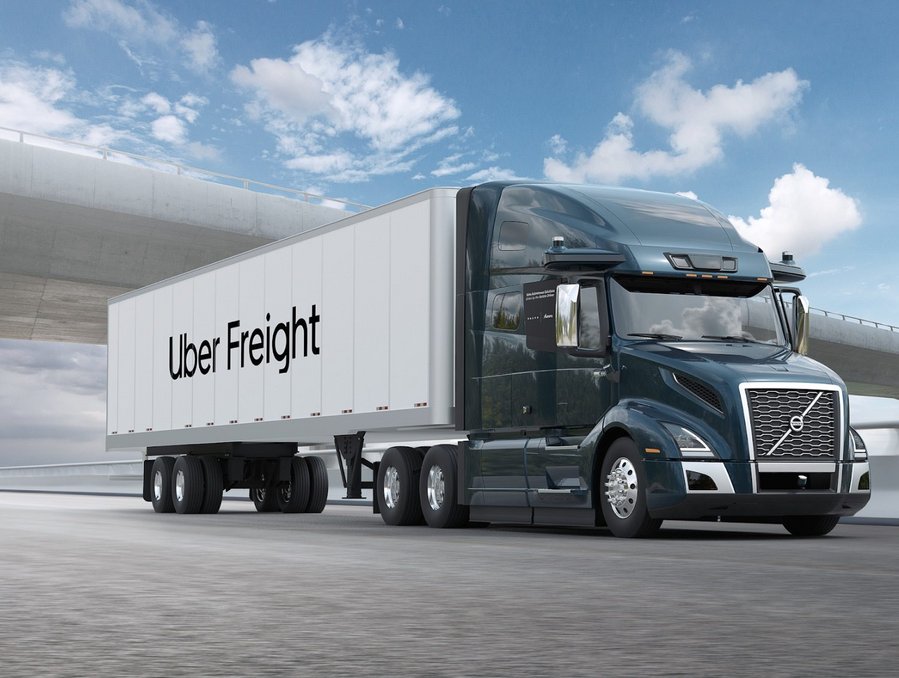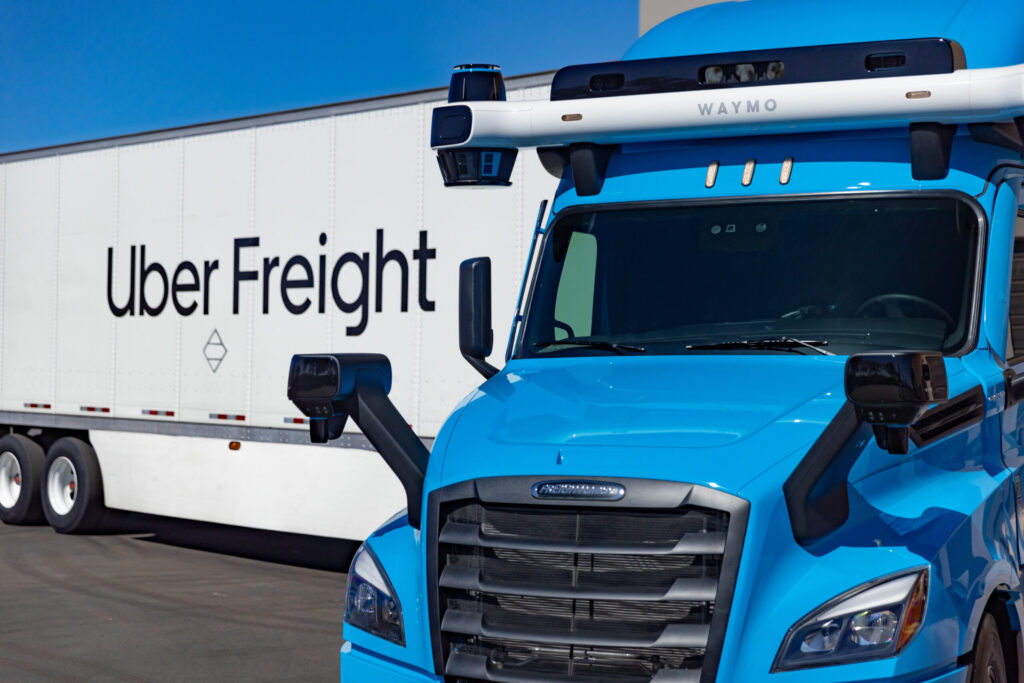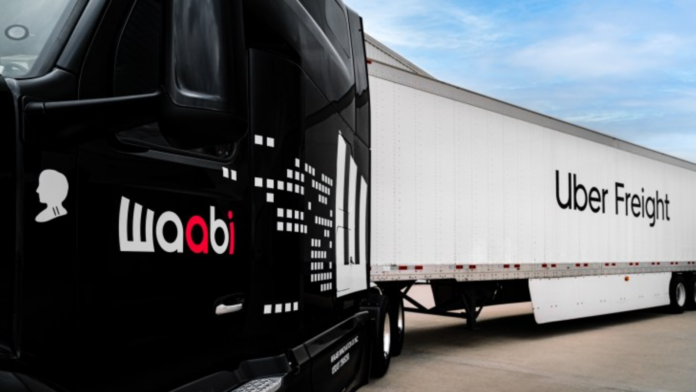Autonomous trucking startup Waabi has entered into a 10-year strategic partnership with Uber Freight. As part of the partnership, Waabi will commit billions of miles of driverless capacity to the Uber Freight network. The collaboration between the two companies aims to accelerate the adoption of autonomous trucking and revolutionize the industry.
Waabi committing billions of miles of driverless capacity
Waabi is taking a significant step forward in the autonomous trucking space by committing billions of miles of driverless capacity to the Uber Freight network. This move demonstrates Waabi’s confidence in its technology and its commitment to bringing autonomous trucks to the market on a large scale.
Test fleet starting commercial pilots with shippers
Starting this week, Waabi’s test fleet will begin commercial pilots with shippers on the Uber Freight network. These pilots will involve hauling goods between Dallas and Houston, providing valuable data and insights into the performance and capabilities of Waabi’s autonomous trucks in real-world scenarios.
Move towards Driver-as-a-Service model
Waabi’s long-term vision is to transition to a Driver-as-a-Service model. Under this model, carriers will have the option to purchase trucks built with Waabi’s innovative driver technology and seamlessly integrate them into the Uber Freight marketplace. This approach would remove the need for human drivers and unlock a new era of efficiency and cost-effectiveness in the trucking industry.
First publicly announced commercial partnership
The partnership between Waabi and Uber Freight is Waabi’s first publicly announced commercial partnership. The fact that Waabi was able to secure such a high-profile partnership so soon after its launch is a testament to the company’s AI-first approach and its ability to deploy and scale quickly compared to its competitors.
Waabi’s AI-first approach
Waabi’s AI-first approach sets it apart from other autonomous trucking startups. The company utilizes a high-fidelity closed-loop simulator called Waabi World to test and teach its self-driving software in real-time. This approach allows Waabi to optimize its technology and achieve faster deployment and scalability, giving them a competitive advantage in the market.
Use of Waabi World simulator
The Waabi World simulator plays a crucial role in Waabi’s development process. It allows the company to virtually test its self-driving software, ensuring its safety and reliability before deploying it on the road. The simulator also enables Waabi to continuously improve its AI algorithms, enhancing the capabilities of its autonomous trucks over time.
Quick route to market
Waabi’s quick route to market is a result of its AI-first approach and the use of the Waabi World simulator. By leveraging these tools, Waabi can rapidly develop and deploy its autonomous trucks, providing a solution to the market’s demand for efficient and cost-effective transportation services.
Results of Waabi’s approach
The results of Waabi’s AI-first approach and the use of the Waabi World simulator speak for themselves. Raquel Urtasun, founder and CEO of Waabi, emphasizes that the company is ready to make a significant impact in the industry. The partnership with Uber Freight is a testament to these results and opens up vast opportunities for growth and innovation.
Uber Freight’s ongoing partnerships
Uber Freight has been actively seeking partnerships in the autonomous trucking space. The collaboration with Waabi adds to the company’s ongoing partnership with Aurora, another autonomous technology company. Uber Freight’s commitment to exploring strategic partnerships highlights its dedication to shaping the future of the transportation industry.
Comparison with Waymo Via
Waymo Via’s previous partnership with Uber Freight
Waymo Via, Waymo’s autonomous trucking unit, previously partnered with Uber Freight in a 10-year, multi-phase partnership. However, Waymo paused its self-driving trucks program in July 2023, redirecting its resources to focus on robotaxi development. This pause in the program led to a shift in the partnership’s dynamics and created an opportunity for Waabi and Uber Freight to form a more integrated collaboration.
Pause in Waymo’s self-driving trucks program
Waymo’s decision to pause its self-driving trucks program reflects the challenges and complexities of developing and deploying autonomous trucking technology. While it may have slowed down Waymo’s progress in the short term, it also highlights the importance of continuous innovation and adaptation in this rapidly evolving industry.
Uber Freight’s more integrated deal with Waabi
Compared to its partnership with Waymo Via, Uber Freight’s deal with Waabi is far more integrated. The collaboration between the two companies involves connecting their software systems, optimizing network operations, load bundling, reducing empty miles, and leveraging data benefits. This level of integration sets a new standard for partnerships in the autonomous trucking space.
Connecting the software systems of both companies
The partnership between Uber Freight and Waabi goes beyond simply sharing resources or technology. The companies are actively working together to connect their software systems, allowing for seamless integration and enhancing the overall efficiency and effectiveness of the autonomous trucking experience.
Benefits of the partnership
The partnership between Uber Freight and Waabi brings numerous benefits to both companies and the industry as a whole. It enables the removal of friction for adoption, provides carriers with access to the entire AV trucking ecosystem, and offers comprehensive support throughout the autonomous trucking journey. This partnership sets a strong foundation for innovation and growth in the autonomous trucking industry.

Driver-as-a-Service Bundle
Waabi’s description of the partnership
Waabi refers to its partnership with Uber Freight as a “Driver-as-a-Service bundle.” This bundle is designed to provide carriers with access to the entire AV trucking ecosystem, offering a seamless and comprehensive solution for adopting autonomous trucks into their operations.
Carriers’ access to the entire AV trucking ecosystem
Through the Driver-as-a-Service bundle, carriers gain access to various components of the AV trucking ecosystem. This includes transfer hubs, load matching, roadside assistance, and maintenance services. By providing a complete package, Waabi and Uber Freight remove barriers to adoption and make it easier for carriers to embrace autonomous trucking technology.
Friction removal for adoption
One of the key objectives of the Driver-as-a-Service bundle is to remove friction for carriers looking to adopt autonomous trucks. By offering a holistic solution that addresses various aspects of autonomous trucking, including infrastructure and support services, Waabi and Uber Freight aim to streamline the adoption process and accelerate the industry’s transformation.
Inclusions in the bundle
The Driver-as-a-Service bundle includes essential services and resources that carriers need to successfully integrate autonomous trucks into their operations. These include transfer hubs to facilitate the transfer of goods between trucks, load matching services to optimize utilization and efficiency, roadside assistance for any unforeseen issues, and maintenance support to ensure the smooth operation of the autonomous trucks.
Importance of long-term pilots
Waabi and Uber Freight are seeking shippers that can commit to long-term pilots, lasting between five to ten years. This extended duration allows both companies to thoroughly understand the impact of autonomous trucks on the future of operations, supply chain management, and network deployment. Long-term pilots are essential for gathering comprehensive data and insights that can drive further optimization and development.
Expansion Plans and Testing
Initial testing on Texas lane between distribution centers
Waabi’s initial testing with shippers on the Uber Freight network will focus on a Texas lane between distribution centers. This specific route provides an ideal testing ground for Waabi’s autonomous trucks, allowing the company to gather valuable data and refine its technology before scaling up operations.
Scalability beyond the Houston-Dallas corridor
Once the initial testing phase is complete, Waabi aims to scale its operations beyond the Houston-Dallas corridor. The success of the pilot program and the positive feedback from shippers will propel Waabi to expand its reach and demonstrate the viability of its autonomous trucking technology in various markets.
Expansion beyond Texas
While the initial focus is on Texas, Waabi has plans for further expansion beyond the state. As the technology matures and gains more acceptance, Waabi envisions a nationwide presence, revolutionizing the trucking industry on a much larger scale.
Safety driver during initial testing
To ensure safety and gain valuable insights, all of Waabi’s autonomous trucks will have a safety driver in the front seat during the initial testing phase. This driver acts as a backup and can intervene if necessary. The presence of a safety driver demonstrates Waabi’s commitment to prioritizing safety during the development and deployment of its autonomous trucking technology.
Transition to fully autonomous driving
As Waabi’s technology advances and matures, the goal is to transition from having safety drivers in the trucks to fully autonomous driving. Removing the need for human drivers will unlock new levels of efficiency, cost-effectiveness, and scalability in the autonomous trucking industry.

Long-Term Strategy and Growth
Challenging freight market cycle
Uber Freight experienced a 30% decline in revenue year-over-year in the second quarter due to the challenging freight market cycle. This volatile market environment highlights the need for innovation and adaptation to ensure sustained growth and profitability.
Playing the long game with Waabi
Uber Freight recognizes the long-term potential of autonomous trucking and is committed to playing the long game with Waabi. The partnership between the two companies positions them at the forefront of the industry and allows them to capitalize on the exponential growth that will occur once autonomous trucks become mainstream.
Anticipated exponential growth
Uber Freight anticipates exponential growth in demand and bottom-line implications once autonomous trucks become a reality. As shippers recognize the benefits of autonomous trucking, the demand for this technology will skyrocket. This expected increase in demand presents significant opportunities for both Waabi and Uber Freight to expand their operations and solidify their positions in the market.
Increased demand and bottom line implications
The adoption of autonomous trucking technology will have profound implications for both shippers and carriers. The increased efficiency, cost-effectiveness, and sustainability offered by autonomous trucks will drive significant improvements in the bottom line for all stakeholders. As the demand for this technology grows, companies like Waabi and Uber Freight are well-positioned to reap the rewards.
Interview with Raquel Urtasun
Importance of differentiation for startups
In an interview, Raquel Urtasun, founder and CEO of Waabi, emphasized the importance of differentiation for startups. Urtasun believes that differentiation is the key to success in a highly competitive and rapidly evolving industry. Waabi’s AI-first approach and its unique Waabi World simulator set the company apart and enable its rapid growth and development.
Insights from Waabi’s founder and CEO
Raquel Urtasun’s experience as the former head of Uber ATG, Uber’s self-driving unit, brings valuable insights and expertise to Waabi. Urtasun’s knowledge of the industry and her understanding of the challenges and opportunities in autonomous trucking position Waabi for success. With Urtasun at the helm, Waabi is well-equipped to navigate the complexities of the autonomous trucking landscape and drive innovation in the industry.
Overall, the strategic partnership between Waabi and Uber Freight represents a significant step forward in the autonomous trucking industry. The commitment of billions of miles of driverless capacity, the testing of commercial pilots, and the move towards a Driver-as-a-Service model all demonstrate the potential for autonomous trucking to revolutionize the transportation industry. With the integration of their software systems and the comprehensive Driver-as-a-Service bundle, Waabi and Uber Freight are well-positioned to shape the future of autonomous trucking and drive exponential growth.












